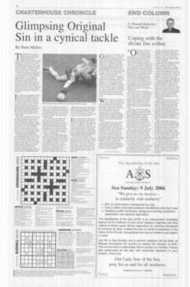Page 5, 30th June 2006
Page 5

Report an error
Noticed an error on this page?If you've noticed an error in this article please click here to report it.
Tags
Share
Related articles
Out Go The Diplomats, In Come The Curial Evangelists
Pope Chooses New Right-hand Man To Reform Roman Curia
Marking The 50th Anniversary Of The Election Of Blessed Pope
Cardinal Bertone Visits Cuba
Bertone Given New Honour
Pragmatic Pope appoints a pastor
ike almost all of Pope Benedict XVI's appointments so far, the nomination of Cardinal Tarcisio Bertone as Secretary of State is both imaginative and pragmatic. For some years, a growing number of officials have been uneasy with the overtly political nature of the Secretariat of State, the most important dicastery in the Roman Curia. It's too powerful, they say, and they rue the day when Paul VI removed the "supremo" status of what is now the Congregation for the Doctrine of the Faith.
But by bringing in Cardinal Bertone, a Salesian jurist and theologian and one of the first non-diplomats to hold the post, Benedict has assigned a pastor to the helm of the Secretariat — a very rare move which could, at the same time, give prominence once again to doctrine within the Curia, but without having to revise the earlier changes of Paul VI.
In one of his first speeches as Pope, Benedict reminded officials in the Secretariat that their main role is to lead others to Christ, "not to defend power". As prefect of the Congregation for the Doctrine of the Faith, he was equally convinced that this should be the Secretariat's role. "Cardinal Ratzinger made no secret of his belief that doctrine and theology, rather than ecclesiastical organisation and diplomacy, should have priority in the life of the Church, and that priority should be reflected also in the work of the Curia," said Fr Richard John Neuhaus, editor of the Ameri. can journal First Things. "It is perfectly understandable that Pope Benedict's appointment of Cardinal Bertone as Secretary of State is viewed as advancing that view of curial priorities."
Cardinal Bertone's previous collaboration with the Pope in the Roman Curia (he was Cardinal Ratzinger's deputy for seven years) was also a factor in his decision. "1 suspect that the appointment means that Pope Benedict is looking less for a 'vice-pope' and more for a trusted interlocutor with whom he can test and share ideas before implementing them", said papal biographer George Weigel.
Within the Vatican, the news was mostly warmly received, though some within the Secretariat of State were slightly sceptical of having a non-diplomat head a department. One Secretariat official firmly supported the appointment, but light-heartedly pointed out that Cardinal Bertone will take up his position on September 15, the feast of Our Lady of Sorrows. In reference to his other recent appointments, a diplomat close to the Holy See said: "The Pope is clearly leaving his own mark. This is no revolution, he's taking things slowly. But he's working very shrewdly — just look at the calibre of personnel he's bringing in."
Once the new Secretary of State takes up his position, other Curial changes are set to follow. George Weigel would like to see one of them involve communications at the Holy See. "I hope that the new Secretary of State takes that in hand, particularly in terms of bring some communications discipline,he said.
"The recent flap over a possible 'change' in the Catholic 'position' on condoms and Aids could have been prevented if certain senior officials hadn't been indiscreet. The new Secretary of State should insist on discretion, and enforce that insistence as necessary."
Now that the most prominent English-speaking bishops' conferences have given their initial approval to the new Mass translation, what happens next? According to liturgical experts, it's now up to the Congregation for Divine Worship to scrutinise the texts and ensure that they are in conformity with Liturgiam Authenticam, the 2001 Holy See instruction on the faithful translation of liturgical texts. The Congregation can reject the translation and send it back to the bishops' conferences for revision. However, although this is fairly common with other liturgical texts, it's unlikely to occur in this case thanks to the bishops' adherence to Liturgiam Authenticam. Once passed, the Congregation will award vital juridical status to the bishops' own approval, otherwise known as a recognitio.
The entire process carried out by the Holy See is expected to be complete by the latter half of 2007, and the new translation implemented in early 2008. "It's a long process and not necessarily easy," said one liturgist close to the review. "But there's now light at the end of the tunnel".
Rome Correspondent: Edward Pentin E-mail: [email protected]
blog comments powered by Disqus

















